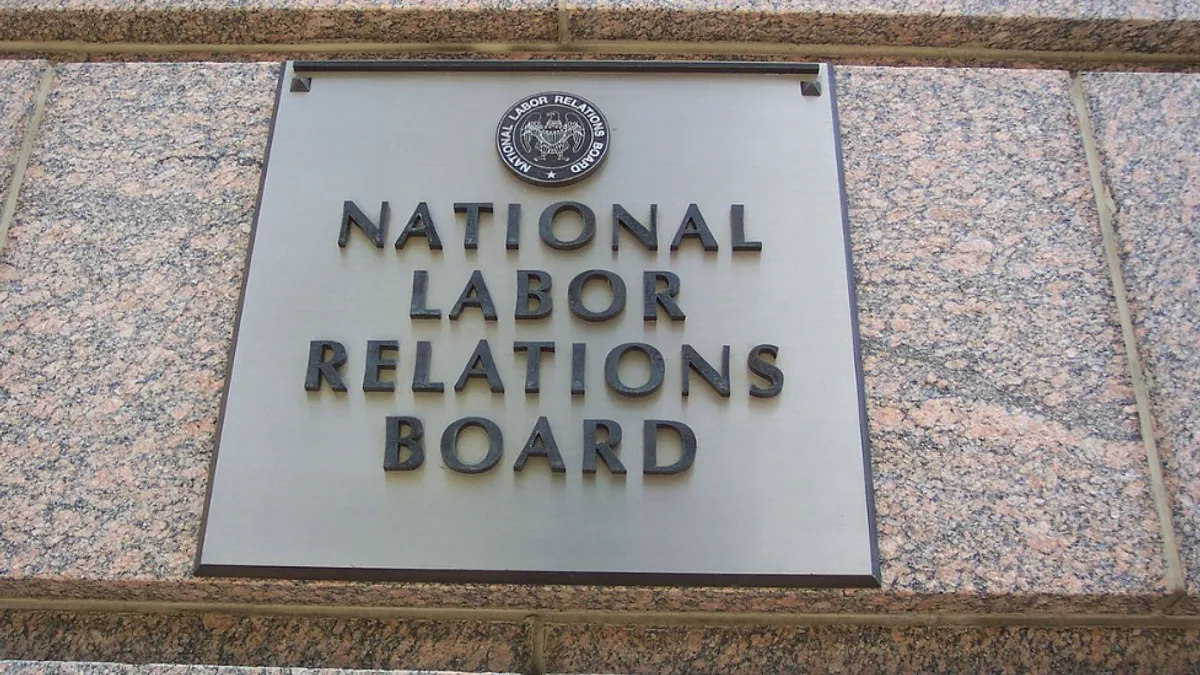UPDATE: Nov. 20, 2023: The National Labor Relations Board has delayed the effective date of its new joint-employer rule to February 26, 2024, “to facilitate resolution of legal challenges with respect to the rule,” the board announced Thursday. Since the rule was announced in late October, the Restaurant Law Center and U.S. Chamber of Commerce have sued the board to stop its implementation, and the International Franchise Association announced it would form a law center to fight against joint employer rules.
Dive Brief:
- The National Labor Relations Board issued a major rule on joint-employer status on Thursday, the culmination of a rulesmaking process that began in 2022. Barring a congressional resolution, the rule will take effect on Dec. 26, according to an NLRB fact sheet.
- The rule broadens the definition of joint employers to include employers that “control essential terms and conditions of employment, whether or not such control is exercised, and without regard to whether any such exercise of control is direct or indirect.” This makes it more likely that franchisors will be treated like employers by the NLRB.
- The National Restaurant Association and International Franchise Association both opposed the rule and said it would lead to problems for restaurant operators, especially franchisors and franchisees.
Dive Insight:
The rule holds that a joint employer must bargain collectively with unionized workers over any term or condition of employment that it possesses the authority or power to control, but does not require a joint employer to bargain over conditions it cannot control. These changes are likely to make unionization somewhat easier in heavily franchised industries.
In California, the threat of a joint employer rule at the state level helped push restaurant industry trade groups to a compromise with the Service Employees’ International Union over a sectoral minimum wage in fast food earlier this year.
The IFA claims the NLRB rule is a return to a 2015 NLRB standard that was in place for several years. However, the Board tightened some of the standards of that decision, adding greater guidance for employers and enumerating the list of essential conditions employers must have the ability to control in order to be considered joint employers.
Those conditions are “(1) wages, benefits, and other compensation; (2) hours of work and scheduling; (3) the assignment of duties to be performed; (4) the supervision of the performance of duties; (5) work rules and directions governing the manner, means, and methods of the performance of duties and the grounds for discipline; (6) the tenure of employment, including hiring and discharge; and (7) working conditions related to the safety and health of employees,” according to the rule.
Sean Kennedy, executive vice president for Public Affairs at the NRA, called the rule “a heavy blow to small business restaurant operators.” The NRA said the rule would lead to labor uncertainty and managerial risk.
Margaret Poydock, a senior analyst at the Economic Policy Institute, a progressive economic think tank, applauded the rule.
“This standard reflects the [NLRA’s] purpose of promoting collective bargaining by adopting a joint-employer standard that enables workers to hold all firms that set their terms and conditions of employment accountable at the bargaining table,” Poydock wrote in an email to Restaurant Dive.
The rule is subject to congressional review under the Congressional Review Act, which gives the legislative branch authority to reject major rules through a joint resolution of disapproval. The last such resolution passed in 2018, according to the Government Accountability Office’s FAQ on the CRA.
“IFA will use every avenue available to protect franchising from the harm this rule will bring, including through the Congressional Review Act,” said Michael Layman, IFA senior vice president for government relations and public affairs.
Under the CRA, Congress has “a 60-days-of-continuous-session period beginning on the day Congress receives the rule,” to initiate a resolution of disapproval. The session days definitions counts calendar days, including weekends and holidays, but excludes days that either chamber (or both) is gone for more than three days pursuant to an adjournment resolution.















